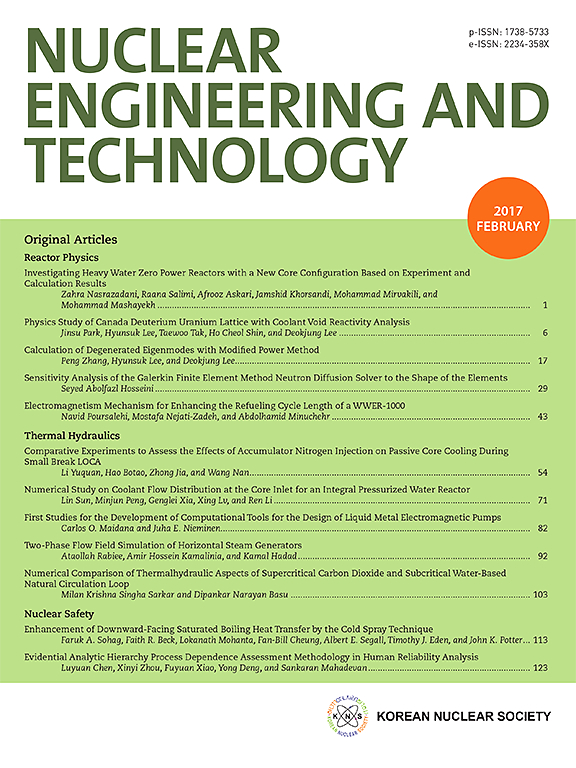Analysis of the atomic ratio of H and Zr effect on the neutronics parameters of ZrH moderated space nuclear reactor
IF 2.6
3区 工程技术
Q1 NUCLEAR SCIENCE & TECHNOLOGY
引用次数: 0
Abstract
Zirconium hydride (ZrH) is an ideal moderator for space nuclear reactors due to its exceptional properties, including high hydrogen content, small neutron absorption cross section, and high operating temperature. The primary goal of this study is to examine how the atomic ratio of H to Zr (H/Zr ratio) influences the neutronics parameters of a ZrH moderated space nuclear reactor, with a focus on establishing a reliable reference for ensuring the optimal safety and minimization of such reactors. The neutronics calculation based on the ZrH moderated space nuclear reactor named Topaz-II is performed using the Reactor Monte Carlo code (RMC code) with the ENDF/VII cross-section database. The effects of the H/Zr ratio were studied with a particular focus on the initial keff, the burnup, the temperature reactivity coefficient and the criticality safety. The results show that with the increase of the H/Zr ratio, the initial keff increases while the drums’ worth decreases. The Moderator Temperature Coefficient (MTC) is a positive value that rises as the H/Zr ratio increases. In the dropping accidents, the reactor full of voids with seawater is more serious, and the introduced reactivity decreases with the increase of the H/Zr ratio.
分析 H 和 Zr 原子比对 ZrH 慢化空间核反应堆中子参数的影响
氢化锆(ZrH)具有氢含量高、中子吸收截面小和工作温度高等优异特性,是空间核反应堆的理想慢化剂。本研究的主要目标是研究氢与锆的原子比(氢/锆比)如何影响氢化锆慢化剂空间核反应堆的中子参数,重点是为确保此类反应堆的最佳安全性和最小化建立可靠的参考。使用反应堆蒙特卡洛代码(RMC 代码)和ENDF/VII 截面数据库对名为黄玉-II 的 ZrH 慢化空间核反应堆进行了中子计算。研究了 H/Zr 比率的影响,重点是初始 k、燃耗、温度反应系数和临界安全性。结果表明,随着 H/Zr 比率的增加,初始 k 会增大,而鼓值会减小。调制温度系数(MTC)为正值,随着 H/Zr 比率的增加而上升。在滴落事故中,反应器中充满海水的空隙更为严重,引入的反应活性随着 H/Zr 比率的增加而降低。
本文章由计算机程序翻译,如有差异,请以英文原文为准。
求助全文
约1分钟内获得全文
求助全文
来源期刊

Nuclear Engineering and Technology
工程技术-核科学技术
CiteScore
4.80
自引率
7.40%
发文量
431
审稿时长
3.5 months
期刊介绍:
Nuclear Engineering and Technology (NET), an international journal of the Korean Nuclear Society (KNS), publishes peer-reviewed papers on original research, ideas and developments in all areas of the field of nuclear science and technology. NET bimonthly publishes original articles, reviews, and technical notes. The journal is listed in the Science Citation Index Expanded (SCIE) of Thomson Reuters.
NET covers all fields for peaceful utilization of nuclear energy and radiation as follows:
1) Reactor Physics
2) Thermal Hydraulics
3) Nuclear Safety
4) Nuclear I&C
5) Nuclear Physics, Fusion, and Laser Technology
6) Nuclear Fuel Cycle and Radioactive Waste Management
7) Nuclear Fuel and Reactor Materials
8) Radiation Application
9) Radiation Protection
10) Nuclear Structural Analysis and Plant Management & Maintenance
11) Nuclear Policy, Economics, and Human Resource Development
 求助内容:
求助内容: 应助结果提醒方式:
应助结果提醒方式:


